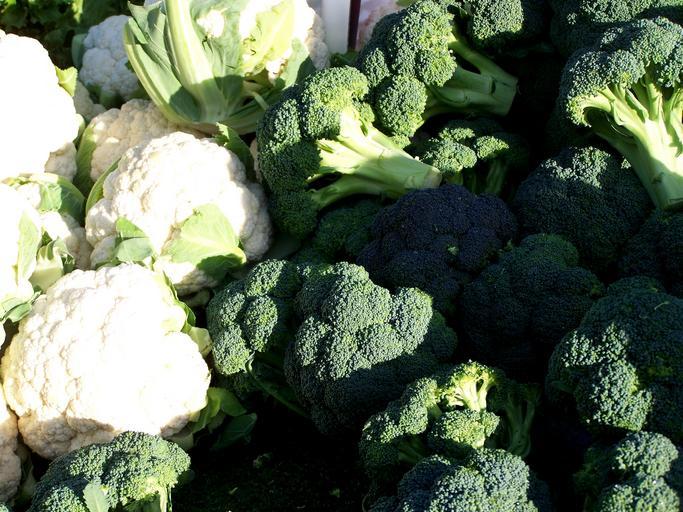By Sheila Dobson, NC
Vegetables are a key part of most healing diets, however, many people need to reduce carbohydrates even from vegetables.
Some people just need to use more low-carb vegetables and less of the high-carb vegetables, whereas others need have almost no carbohydrates. Those following ketogenic diets need to restrict carbohydrates the most; ketogenic diets usually contain around 20 – 50 grams per day — the amount varies based on the person’s ability to stay in ketosis and still eat some carbohydrate.
The following list describes ten vegetables that are both very low in carbohydrates and also quite nutrient dense. There are definitely many other very low carbohydrate vegetables as well. Following this first list is a more complete list with carbohydrates contained in many more types of vegetables with amounts based on typical serving sizes and modes of serving (ie raw, cooked, sauteed, etc).
Ten Low Carbohydrate Vegetables. All numbers are net carbs per 100 grams (3½ ounces).
- Cauliflower – 3 g. Perhaps the most classic and iconic of all low-carb vegetables. The base of cauliflower rice dishes, cauliflower mash dishes and others.
- Cabbage – 3 g. Another great low-carb vegetable. Try it in a stir fry or a salad.
- Avocado – 2 g. Not just low carb, but also full of nutritious fat. Technically a fruit, but most people think of it as a vegetable. Avocado can be eaten in all kinds of ways, including on its own, in salads, or it can be used to make guacamole.
- Broccoli – 4 g. Another great option that can replace pasta, rice or potatoes. Try frying it, or adding some cheese.
- Zucchini – 3 g. Zucchini can be used to make zucchini fritters, zucchini pasta, zucchini chips, zucchini salad, and many more dishes that are low carbohydrate.
- Spinach – 1 g. An extremely low-carb vegetable, spinach is full of vitamins and minerals and can be used many ways. Try spinach with eggs, in a salad, or a stir fry.
- Asparagus – 2 g. Try it steamed, with some butter or mayonnaise, or add it cold to a salad after steaming. Pairs well with all meats.
- Kale – 3 g. Nutrient-rich, kale can be chopped and stir-fried, steamed, baked, blended or added to a salad.
- Green beans – 4 g. steam first then dice and toss in a salad, add to a soup or stew. Green beans taste great with added fats like butter, olive-oil vinaigrette, or just some olive oil, fresh garlic and lemon juice.
- Brussels sprouts – 5 g. Nutty, filling and nutritious, they are especially good roasted with olive oil and garlic.
More Comprehensive Vegetable-Carbohydrate Data
The list below describes both the vegetables above and other low carbohydrate vegetables, giving the amount of carbohydrates contained in typical serving sizes.
- radishes — 5 medium sized radishes, raw = 1 g
- alfalfa sprouts — 1/2 cup, raw = 0.35 g
- lettuce — 1 cup, raw = 1 g
- celery — 1 stalk, raw = 1.2 g
- celery — 1 cup, cooked = 6 g
- green onion/scallion, raw — 1 large = 1.8 g
- bok choy — 1 cup, cooked = 3 g
- garlic — 3 cloves, raw = 3 g
- leeks — 1/4 c. cooked = 4 g
- zucchini — 1 cup, cooked = 4.8
- tomato — 1 medium, raw = 4.8 g
- green bell pepper — 1 cup, sauteed = 4.8 g
- cauliflower — 1 cup, cooked = 5.2 g
- mustard greens — 1 cup, cooked = 6 g
- summer squash — 1 cup, cooked = 6.8 g
- spinach — 1 cup, cooked = 7 g
- kale — 1 cup, cooked = 7 g
- swiss chard — 1 cup, cooked = 7 g
- sweet red (bell) pepper — 1 cup, sauteed = 7 g
- spaghetti squash — 1 cup, cooked = 7 g
- okra — 1 cup, cooked = 7.2 g
- asparagus — 1 cup, cooked = 7.4 g
- turnips — 1 cup, cooked = 8 g
- green cabbage — 1 cup, cooked = 8.2 g
- eggplant — 1 cup, cooked = 9 g
- green beans — 1 cup, cooked = 10 g
- onions — 1 med, cooked = 10 g
- red cabbage — 1 cup, shredded = 10 g
- cucumber — 1 average, raw = 11 g
- collard greens — 1 cup, cooked = 11 g
- jicama — 1 cup, sliced, raw = 11 g
- rutabaga* — 1 cup, cubes, cooked = 12 g
- pumpkin* — 1 cup, mashed, cooked = 12 g
- broccoli — 1 cup, cooked, 12 g
- carrot — 1 cup, sliced, cooked = 12 g
- brussels sprouts — 1 cup, cooked =12 g
- artichokes — 1 med, cooked = 14 g
*rutabaga and pumpkin are starch containing vegetables; most other vegetables contain only simple sugars

